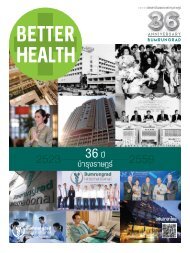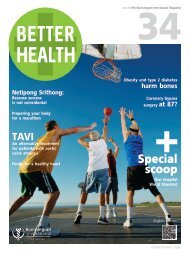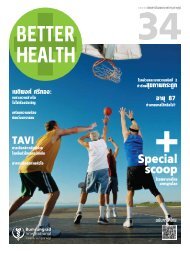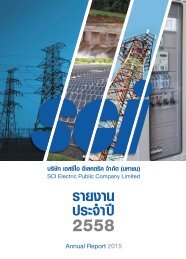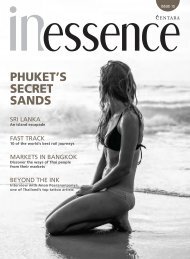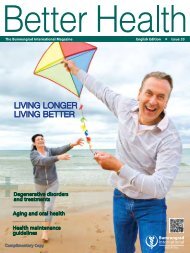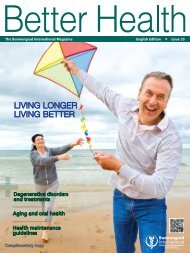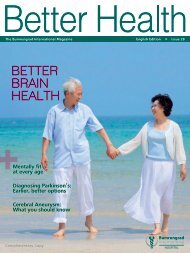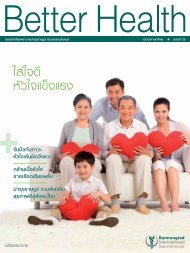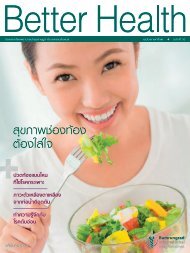Better Health 25 Eng
The magazine for patients and friends of Bumrungrad International Hospital, Thailand.
The magazine for patients and friends of Bumrungrad International Hospital, Thailand.
- TAGS
- bumrungrad
- hospital
- thailand
Create successful ePaper yourself
Turn your PDF publications into a flip-book with our unique Google optimized e-Paper software.
M.D. FOCUS<br />
Get to know our doctors<br />
Meet four Bumrungrad physicians as they share their thoughts on <br />
a range of health care topics.<br />
Providing the highest standards of patient care requires a hospital-wide commitment and <br />
professional expertise. Bumrungrad’s medical staff includes over 900 world class doctors <br />
of the highest caliber, with outstanding professional credentials and advanced training <br />
across the full spectrum of medical sub-specialties.<br />
Dr. Ketchai Suavansri Neurologist<br />
After graduating from Mahidol University’s Faculty of Neurology, Dr. Ketchai began<br />
his medical practice as the sole neurologist in the province of Samut Sakhon. He<br />
gained a wealth of practical experience while fulfilling his tuition waiver commitment.<br />
Dr. Ketchai later joined the Prasat Neurological Institute and eventually headed<br />
to the US to continue his medical training in Alzheimer’s disease.<br />
Q: In your experience,<br />
what aspect of your work<br />
has been the most<br />
challenging? <br />
A: As a doctor in the<br />
suburbs, it can be difficult<br />
to correct people’s misconceptions<br />
and false beliefs<br />
about medicine. I once had to deal with a patient whose<br />
paralysis got better after a rinsing with “magic” water.<br />
Despite my attempts to show that paralysis can sometimes<br />
heal by itself, word quickly spread about the wonders of<br />
magic water. <br />
Dealing with patients who brew their own home-made<br />
medicine poses a real challenge. Sometimes the home<br />
brew contains steroids, giving the patient the impression<br />
they’re feeling better at first, and the serious side effects<br />
only crop up later. There is still much to be done to change<br />
these mistaken beliefs. <br />
Q: What made you decide to join the medical team<br />
at Bumrungrad?<br />
A: Although Bumrungrad operates as a private hospital,<br />
the management doesn’t focus solely on the business side.<br />
The hospital has a good academic atmosphere that<br />
encourages learning and collaboration, and there is a <br />
strong emphasis on staying true to medical ethics. I feel <br />
proud to be a part of the team here.<br />
Dr. Tanawat Jirakulaporn Hematologist and oncologist<br />
While studying at Washington University in the US, Dr. Tanawat had the<br />
opportunity to take part an important research in the field of hematology<br />
and oncology. That spurred him to expand his knowledge and gain experience<br />
treating patients in this field, and he went on to earn a number of board<br />
certifications from international institutes.<br />
Q: Are there cases that you find most memorable? <br />
A: I once had a patient from Ethiopia who had been<br />
diagnosed with stomach cancer by another hospital.<br />
After we ran some tests on his condition, we discovered<br />
he was actually suffering from a rare disease called myeloid<br />
sarcoma, where leukemia cells combine together to form<br />
a solid mass. <br />
Preparing for the treatment was quite frantic, but<br />
there was no choice but to rush because of leukemia’s<br />
fast-developing nature. There are cases like this from<br />
time to time, where the original diagnosis is not correct<br />
and where you really see how having fully competent<br />
medical staff and advanced technology makes a difference<br />
in producing an accurate<br />
diagnosis. <br />
Q: What challenges <br />
you the most in your<br />
work in oncology? <br />
A: It is always difficult<br />
when a patient’s cancer<br />
is not treatable and the<br />
prognosis is terminal. We oncologists, need not only to<br />
provide end-of-life care for patients but also to assist<br />
families and loved ones. It is a difficult time for everyone<br />
involved, and we have a duty to alleviate as much of the<br />
pain and grief as possible.<br />
12



